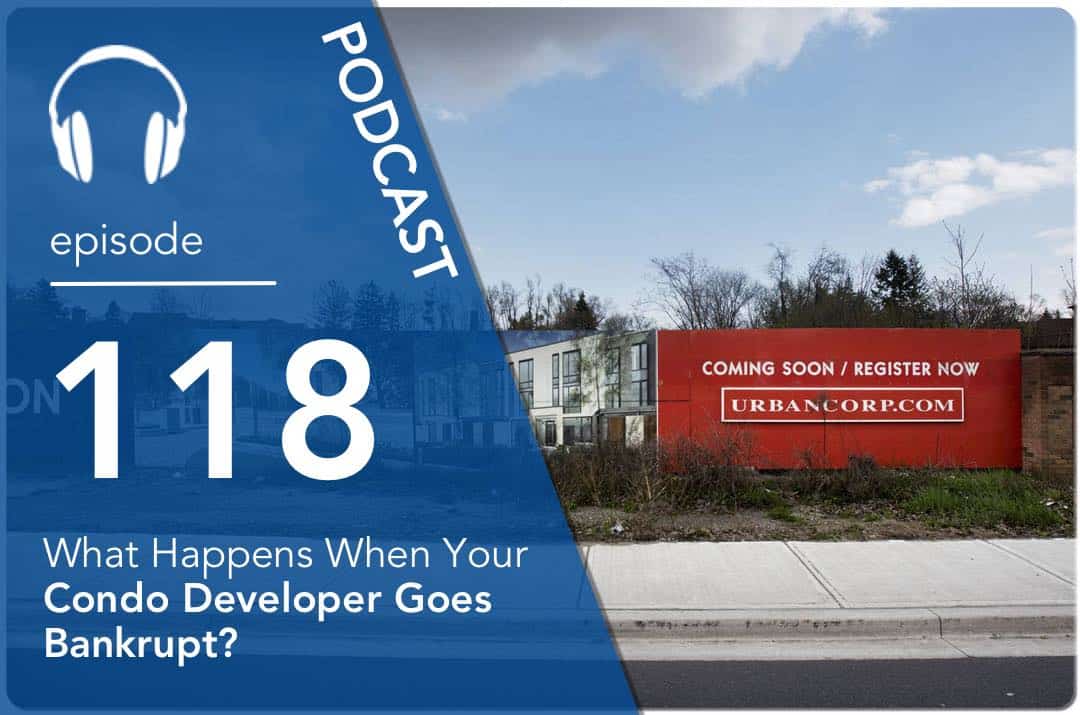What Happens When Your Condo Developer Goes Bankrupt?

Toronto developer Urbancorp looks to come out of their bankruptcy proceedings with $31m in their pocket, yet none of their purchasers will be getting their homes. What happened here and more importantly what can we learn from this saga as real estate investors?
EPISODE HIGHLIGHTS
2:15 It’s extremely rare.
3:34 Your deposits are protected by your Tarion insurance program.
5:23 Be careful. If you’re purchasing a low-rise home.
6:13 When a developer goes bankrupt, it goes to normal bankruptcy proceedings.
9:09 Three lessons that we can take from the urbancorp situation.
11:35 Assets win. Real estate wins.
13:30 Assets are the ultimate insurance.
14:20 Buy from reputable developers.
14:40 Make sure that your deposits are held in trust.
Click Here for Episode Transcript
Andrew la Fleur: Toronto developer, Urbancorp, could reap a $31 million windfall from their bankruptcy filing, but their buyers will not be getting their homes. Find out what this means to you as an investor on today’s episode.
Speaker 2: Welcome to the True Condos Podcast, with Andrew la Fleur. The place to get the truth on the Toronto condo market and condo investing in Toronto.
Andrew la Fleur: Hi, and welcome back to the show. Apologies in advance, my voice probably sounds terrible. On today’s recording, I am fighting a really bad cold right now. I’ve been fighting it for the past week or so. Bear with me as we talk about the Urbancorp situation. As we answer the question; what happens when your condo developer goes bankrupt? Obviously, that’s what happened in the case of Urbancorp, if you haven’t heard.
Urbancorp was a fairly large Toronto developer, condominiums and homes. They got out of the condo business for the most part a couple of years back and they were focusing on the low-rise home developments. They had several across the city. They went bankrupt. They declared bankruptcy, and they ran to some major financial troubles. They obviously over-leveraged themselves to the point where they could not pay their creditors. They stretched themselves too thin, it seems, and they were not able to build all these projects across the city, which they had sold.
Wanted to answer the questions I sometimes get is; what happens if you put a deposit down on a condo and your developer goes bankrupt? First of all, I want to make a point that this is extremely rare; number one. This is extremely rare. In the last 10 to 20 years in the Toronto new home development scene, this thing where a developer has gone bankrupt, to gone kaput, this has happened maybe a couple of times at the most. Other than Urbancorp, it’s hard to even really think of any other examples of this ever happening. There maybe one or two others, but it’s extremely, extremely rare. Out of the hundreds of thousands of homes and condos built from new home builders in the GTA in the last 20 years, this is a fraction of 1% of the time that something like this could happen.
That’s the most important thing to understand, is it is not something that, thankfully, we really have to worry about at any kind of a scale. It is something to be prepared for and to understand that it could theoretically happen to any one at any time, because companies make their own decisions. As in the case of Urbancorp, as a purchaser, as a client of that company, you are at the mercy of the decisions that they have made financially. In this case, it didn’t work out well for the purchasers, these projects.
The second thing is that understanding that your deposits are protected by Tarion when you purchase a new condo, especially that is assuming your builder is a Tarion builder, which the vast, vast, vast majority of condos … I don’t even know if there are any condominium builders that are not Tarion builders. There are maybe some home builders that are not under Tarion, but certainly, condo builders are.
Your deposits are protected by your Tarion insurance program that you pay for as a purchaser. They’re protected up to $20,000 for condominiums, and up to $40,000 for homes. That’s the first thing, is some people think that all of their deposits are covered. That is not true. Your deposits are only protected from an insurance perspective, by Tarion, up to $20,000 if we’re talking about condos, and $40,000 if we’re talking about homes.
Here’s the thing. The reality is that the deposits, of course, are held in trust. The vast majority of the time, that is. The deposits are held in trust by the developer’s lawyer, the developer’s law firm. When you write your checks out, you’re not usually writing the amount to the developer themselves, their company. You are writing them to the developers lawyer in trust.
These funds cannot be touched in theory by the developers. Even though you do not have full insurance on all these moneys. Assuming the developer and the lawyer and not corrupt, the money is just sitting there in a trust account and it can’t be accessed by the builder. Your funds in effect are safe from that perspective. There’s another safeguard to protect your funds from suddenly disappearing, or you have a builder doing something bad and taking your funds and running away to Mexico, or something like that.
You do need to know that, especially if you’re buying a low-rise home. Sometimes you … Some condominium developers … Be careful. If you’re purchasing and you’re putting the deposits, you’re paying them directly to the builder, or one of the builder’s company, so that it’s not being held in trust. Do understand the inherent risk with something like that. I’m not here to say you should never purchase a condo or a home if that is the case, but do understand that that is obviously an added risk, a fairly significant added risk if you are putting your deposits not in a lawyer’s trust account.
Again, that being said, in the last 20 years, how many times has that come back to hurt purchasers? Extremely, extremely, extremely rare. It is that added risk if it is not put in the developer lawyer’s trust account.
Next point. When a developer goes bankrupt, it goes to the normal bankruptcy proceedings that any company or individual would go through when they’re doing a bankruptcy filing. Basically, as you can imagine, as a purchaser of a condo from a multimillion dollar company corporation with many debts, and assets, and liabilities, the individual purchasers are very low down the list of people to get paid out in a bankruptcy filing.
The major creditors and the banks and everything will be paid before you. There’s always an order to how these things are done. You are a low priority, low down the list of people to get their money back in a bankruptcy proceeding as many of these Urbancorp purchasers have found out, unfortunately, the hard way, and the painful way, as some of them have been waiting for two years, in some cases, to get their money back. Unfortunately, that is just the way that the procedure goes.
Again, in the last 20 years, there’s no stories or many situations, and the GTA developers actually taking purchasers’ deposits and not returning them at some point. It just may take a lot longer.
Really, the biggest thing, of course, is when a developers goes bankrupt and your money is tied up in these bankruptcy proceedings and you’re waiting, waiting, waiting for these proceedings to go through before you can get your deposits back. The biggest thing is time. The market continues to move and you are sitting there with your hands in your pockets and your money is tied up and it could be otherwise invested somewhere else. You’re losing years of equity, and growth, and profits from the money sitting there.
This was especially the case in many of these Urbancorp projects that were low-rise freehold home projects. Whereas, of course, that market has absolutely exploded in the past few years. If somebody bought in 2013 a freehold home for 800,000. Now, today, that same one is going for 1.1 or 1.2. That’s hundreds of thousand dollars of theoretical paper gains that you’ve lost out on.
That’s some general comments about what happens when a developer goes bankrupt. Again, the main underlying point being, it is extremely rare. It’s not something to be overly dramatic or overly concerned about, but you do need to understand some of those things.
Here, I’m going to talk about three … Finish this podcast with, most importantly, three lessons that we can take from the Urbancorp situation. What are three lessons that I think we could take from this? The number one thing that I take from this is maybe a little bit different from most people. Most people will look at this situation and say, “Well. See? There you go. There you go son.”
This is your uncle at the upcoming Christmas dinner that you’re going to, or whatever, “This is why you shouldn’t invest in real estate. See? It is risky. You can lose your money, or a crooked developer can come along and take your money and sit on it for years and eventually you get it back. Hey! It’s like taking your money. See? This is why you don’t want to invest in real estate.”
I actually look at it in a totally different way. I look at it as … Well, Urbancorp actually proves the exact reason that Urbancorp situation proves exactly why you do want to invest in real estate. Look what happened to the company themselves, and how it happened, and why it happened. What happened? They obviously made bad decisions. I’m not defending what they did as a company many means. I’m simply observing the fact that this company invested in an asset, that is land, and they made some bad financial decisions. Because they made that first good decision of investing in land, they actually came out ahead in the end even though they went through a whole bunch of crap and they put a whole bunch of people through a whole bunch of crap.
In the end, the company themselves actually win. The company is, as it says in this article, companies coming out potentially with a $31 million profit, and they never even built a single home. When they went through a bankruptcy proceeding, they never built a single home, and they are making $31 million. Why? They made the smart first decision of purchasing all these pieces of land across the city. That asset that they had is now, in a sense, paying them huge dividends.
Again, it’s a weird, and twist, and sick way how it all worked out in a sense, especially if you’re looking at it from a consumer or a purchaser perspective. If you were a purchaser of them and you’re listening to this, you probably don’t agree with me. I just do ask you to consider that this is, again, further evidence and further proof as to why we are real estate investors in the first place, that assets win. Real estate wins in the end. You acquire assets. You sit on those assets. Overtime, you will always do well, and you will always benefit, and you always win.
In this strange topsy–turvy that it is, somehow this company that went bankrupt, comes out ahead. How many … It said in the article, “Have you ever heard of a company that goes through bankruptcy proceedings and they actually come out ahead at the end of it? It’s a very strange thing.
Again, it’s all predicated by the fact that they made a smart decision the first place of buying these good assets, these good pieces of land in the first place. They appreciated in value and they were able to sell them through the bankruptcy proceedings for a lot more than they paid for them, because of the passage of time and in the growth of the market. Things worked out well for that company. Things didn’t work out so well for any of these purchasers. In the end, they will all get their deposits back and they will be able to eventually financially recover and purchase something else for the most part.
Again, not a great situation, but thankfully, thankfully, nobody is out on the street, or nobody’s money has disappeared. Thankful for that. I think the question I asked is not using this as a way to say, “Look. This is why you should not invest in real estate, because it’s risky.” That’s how a lot of people look at it. I look at it and say, “How can I set myself up in life, in business, financially speaking? How can I set myself up, or my company, or however you look at it, to be like Urbancorp? Where even if things go back, they still work out well for me?”
I think the answer to that in a weird way in the lesson here is that assets are the ultimate insurance. If you have assets, cash flowing assets, like real estate, something that is appreciating in value, and that there’s some scarcity attached to it, and that there’s some perpetual demand attached to it. Obviously, we’re talking about real estate. There maybe other assets that this model is well for you in your situation.
If you have those assets when things go bad, you could still come out on top if you are the owner of the asset. Continue to acquire real estate. Continue to acquire assets, because, again, it just keeps continually proving itself as the way to get ahead financially in this world. That’s the first thing.
Number two is, of course … Number two. What do we take from this? What do we take from the Urbancore situation? Buy from reputable developers, obviously. The more reputable the developer is that you buy from, the less likely any type of scenario like this is going to happen to you as a purchaser. Look at the developer’s track record. Understand what they’ve done. Understand the type of company that they are, and understand who you’re buying from. Obviously, working an expert like me who knows the best companies to work with is always advisable.
Number three, the last thing, is make sure that your deposits are held in trust. These deposits were held in trust with Urbancorp if they were not … Who knows what might have happened to all these deposits, or these people? It might have worked out not as well. It might have worked out very poorly for a lot of these people if they were not.
Of course, the exception is with some freehold homes. You’re often going to encounter with freehold homes, that the deposits are paid to the developer and not held in trust. Again, that goes back to the point I just said about make sure you’re buying from reputable developers. People who’ve been around for a long time, have a long track record, and who’ve built a lot of product. That is going to always minimize your risk with respect to anything like this happening to you.
Okay. That is all I have to say about this. Again, the show notes for this episode, the link to the article from the National Post this week, that is talking about the Urbancorp situation. I will include that in the show notes. You can get the show notes for this episode and every episode at truecondos.com/podcast and you’ll find the notes to this episodes and all the others including links and more information.
Okay. I hope you have a great week, and we will talk to you soon.
Speaker 2: Thanks for listening to the True Condos Podcast. Remember, your positive reviews make a big difference to the show. To learn more about condo investing, come at truecondos.subscriber by visiting truecondos.com.






